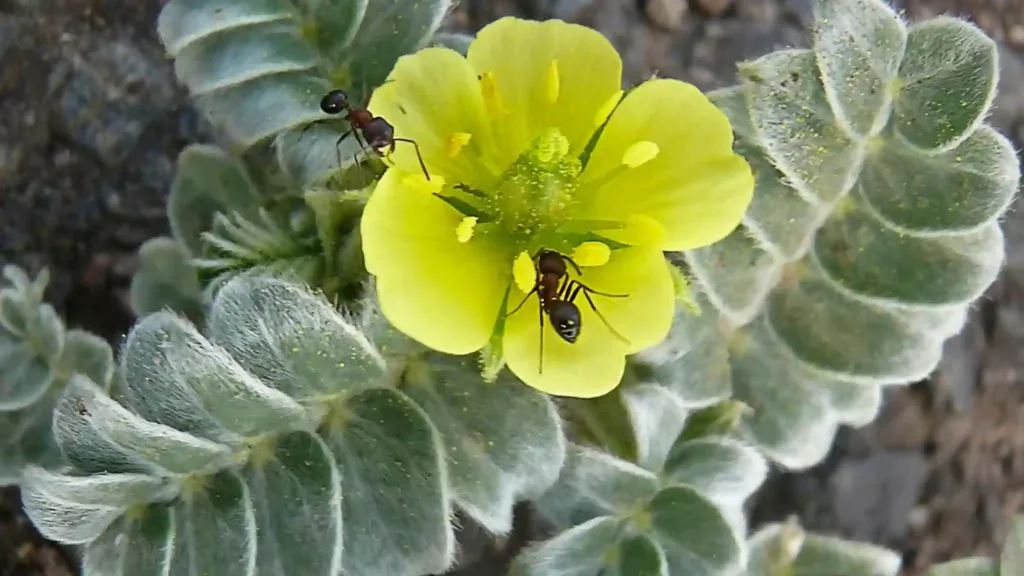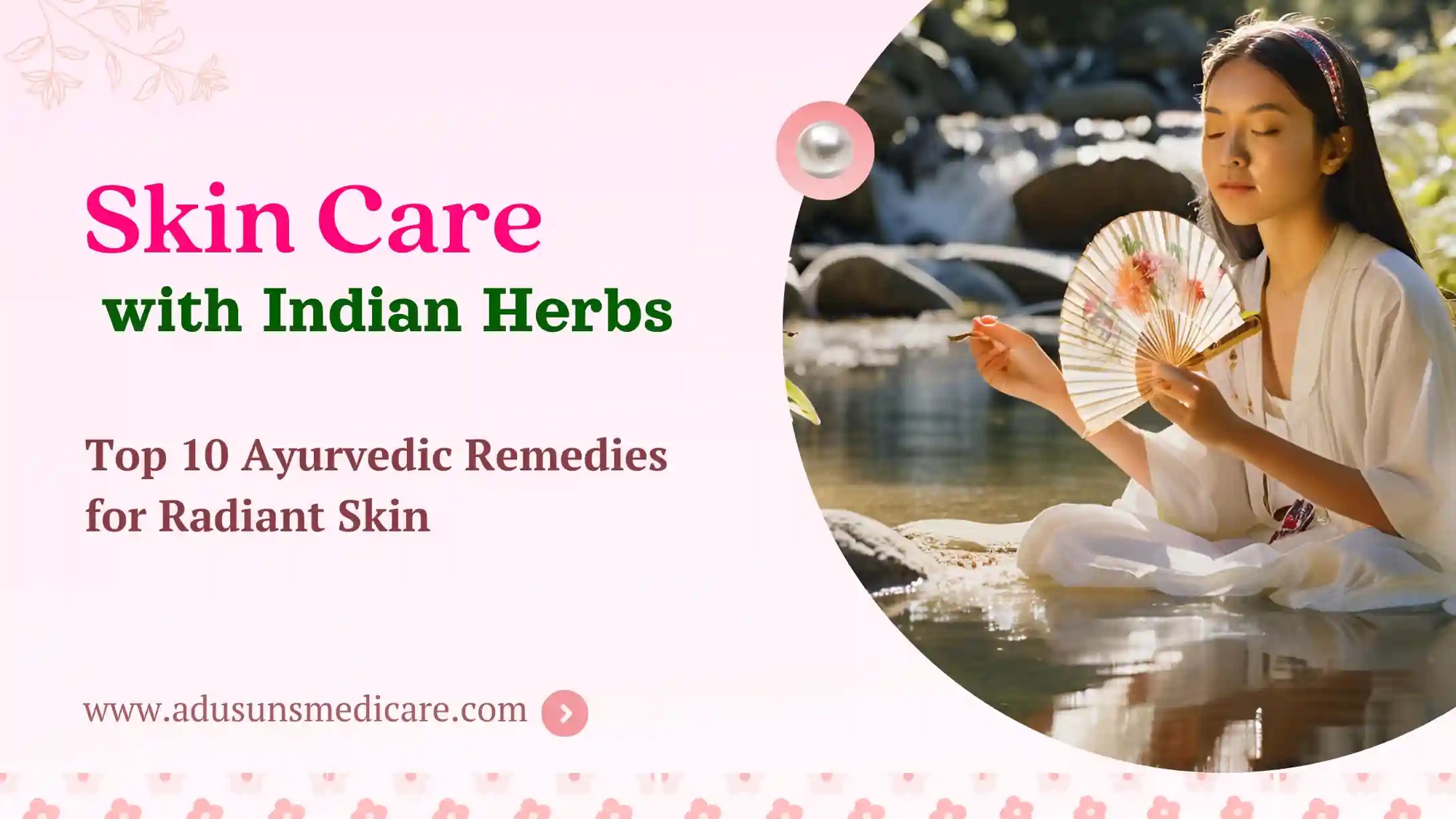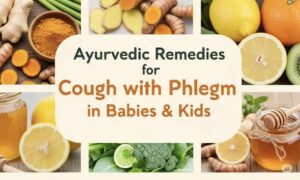Skin Care with Indian Herbs
Let’s explore the transformative benefits of Ayurvedic herbs for skin care with top 10 ayurvedic Indian herbs. These natural treasures not only promote radiant skin but also nurture overall well-being. Which are the ayurvedic Herbs for Healthy Skin.Let’s delve into their benefits, usage tips, and answer your questions about these herbal wonders.
Top 10 Ayurvedic Indian Herbs for Skin Care
1. Neem (नीम)

- Local Name: Neem
- Biological Name: Azadirachta indica
- Benefits: Antibacterial and anti-inflammatory properties fight acne and infections.
- Found In: Throughout India, especially in dry regions.
- Consumption: Neem tea or capsules are common forms.
- Recommended for: Acne-prone skin
- Duration: Safe for regular use; consult a healthcare provider for long-term use.
- Who can consume: Generally safe for adults; pregnant women should avoid high doses.
100% Natural Neem Capsules : Shop Now
2. Turmeric (हल्दी)

- Local Name: Haldi
- Biological Name: Curcuma longa
- Benefits: Anti-inflammatory and antioxidant properties heal wounds and brighten skin.
- Found In: Southern India, widely cultivated.
- Consumption: Add turmeric to milk or use it in cooking.
- Recommended for: Inflammatory skin conditions, wounds
- Duration: Regular consumption is beneficial; moderation is key.
- Who can consume: Generally safe; avoid in large quantities during pregnancy.
3. Aloe Vera (ग्वारपाठा)

- Local Name: Gwarpatha
- Biological Name: Aloe barbadensis
- Benefits: Moisturizes, reduces inflammation, heals wounds and scars.
- Found In: Cultivated across India, especially in dry regions.
- Consumption: Aloe gel can be consumed in juices or applied topically.
- Recommended for: Sunburns, acne scars, dry skin
- Duration: Safe for regular use; topical application is preferred.
- Who can consume: Generally safe; those allergic to latex should avoid oral consumption.
4. Burdock Root (गोखरू)

- Local Name: Gokhru
- Biological Name: Arctium lappa
- Benefits: Purifies blood, detoxifies body, clears acne and eczema.
- Found In: Northern India, in temperate regions.
- Consumption: Burdock root tea or capsules are common forms.
- Recommended for: Acne, eczema
- Duration: Short-term use recommended; consult for prolonged use.
- Who can consume: Generally safe; avoid if allergic to daisies or related plants.
100% Natural Gokhru Capsules : Shop Now
5. Manjistha (मंजिष्ठा)
- Local Name: Manjistha
- Biological Name: Rubia cordifolia
- Benefits: Cleanses blood, detoxifies body, treats acne and pigmentation.
- Found In: Himalayan regions, especially in forests.
- Consumption: Manjistha powder or decoction is commonly used.
- Recommended for: Acne, pigmentation
- Duration: Consult with an Ayurvedic practitioner for optimal duration.
- Who can consume: Generally safe; avoid during pregnancy and lactation.
6. Guggul (गुग्गुल)
- Local Name: Guggul
- Biological Name: Commiphora wightii
- Benefits: Anti-inflammatory properties benefit eczema and psoriasis.
- Found In: Arid regions of Rajasthan and Gujarat.
- Consumption: Guggul capsules are preferred for oral consumption.
- Recommended for: Eczema, psoriasis
- Duration: Short-term use is recommended; consult for prolonged use.
- Who can consume: Generally safe; avoid during pregnancy and lactation.
7. Licorice (मुलेठी)
- Local Name: Mulethi
- Biological Name: Glycyrrhiza glabra
- Benefits: Anti-inflammatory and skin-lightening properties treat hyperpigmentation and eczema.
- Found In: Cultivated throughout India, especially in semi-arid regions.
- Consumption: Licorice powder can be mixed with water or milk.
- Recommended for: Hyperpigmentation, eczema
- Duration: Short-term use is recommended; avoid prolonged consumption.
- Who can consume: Generally safe; those with hypertension should avoid high doses.
8. Gotu Kola (ब्राह्मी)
- Local Name: Brahmi
- Biological Name: Centella asiatica
- Benefits: Improves collagen production, strengthens skin, aids wound healing.
- Found In: Wetlands of India, especially in Kerala and Tamil Nadu.
- Consumption: Gotu Kola leaves are consumed in teas or as extracts.
- Recommended for: Wound healing, firming skin
- Duration: Safe for regular use; consult for specific conditions.
- Who can consume: Generally safe; avoid during pregnancy and lactation.
9. Calendula (गेंदा)

- Local Name: Genda
- Biological Name: Calendula officinalis
- Benefits: Soothes skin, reduces inflammation, heals wounds and rashes.
- Found In: Cultivated across India, especially in gardens and farms.
- Consumption: Calendula petals can be infused into teas or applied topically.
- Recommended for: Sensitive skin, wounds
- Duration: Safe for regular use; topical application is preferred.
- Who can consume: Generally safe; avoid if allergic to plants in the Asteraceae family.
10. Sarsaparilla (अनंतमूल)

- Local Name: Anantmool
- Biological Name: Hemidesmus indicus
- Benefits: Blood purification, detoxification, manages psoriasis and eczema.
- Found In: Forests of Central and Southern India.
- Consumption: Sarsaparilla roots are brewed into decoctions.
- Recommended for: Psoriasis, eczema
- Duration: Short-term use recommended; consult for prolonged use.
- Who can consume: Generally safe; avoid during pregnancy and lactation.
100% Natural Sarsaparilla Capsules : Shop Now
FAQs about Skin Care with Indian Herbs
Q1: What are Ayurvedic herbs, and how do they benefit skin health?
- A: For Skin care Ayurvedic Indian Herbs are natural plants used in traditional Indian medicine (Ayurveda). They benefit skin health by purifying the blood, detoxifying the body, and providing anti-inflammatory and antioxidant properties that promote clear, radiant skin.
Q2: Can Ayurvedic herbs be consumed orally for skin benefits?
- A: Yes, many Ayurvedic Indian herbs which are good for skin care can also be consumed orally in the form of teas, powders, capsules, or extracts. They work from within to address underlying causes of skin issues like acne, eczema, and pigmentation.
Q3: Who should avoid using Ayurvedic herbs for skin health?
- A: Pregnant and lactating women should exercise caution and consult with a healthcare provider before using Ayurvedic Indian herbs for skin care. Individuals with allergies to specific plants should also be mindful of potential reactions.
Q4: Which Ayurvedic herb is best for acne-prone skin?
- A: Neem (नीम) and Turmeric (हल्दी) are excellent choices. Neem has antibacterial properties, while Turmeric reduces inflammation and supports skin healing.
Q5: Are Ayurvedic herbs effective for treating chronic skin conditions like eczema and psoriasis?
- A: Yes, Ayurvedic herbs such as Guggul (गुग्गुल), Manjistha (मंजिष्ठा), and Sarsaparilla (अनंतमूल) have shown efficacy in managing chronic skin conditions due to their anti-inflammatory and detoxifying properties.

Conclusion
Embrace the natural goodness of Ayurvedic herbs for radiant skin and overall wellness. Whether you’re dealing with acne, pigmentation, or dryness, these herbs offer gentle yet effective solutions rooted in centuries-old wisdom.
Disclaimer
While Ayurvedic herbs are generally safe for consumption, individual reactions may vary. This blog is for informational purposes only and does not substitute professional medical advice. Consult a qualified healthcare provider before starting any herbal regimen, especially if pregnant, nursing, or taking medications.


Shop Now : Boost Your Bone Health with Natural Calcium – Aducal Syrup!








Add comment